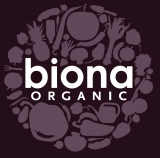Why Go Organic
6th Sep 2018
.jpg)
Is it just the wonderful taste? Foodies agree organic versions of conventional foods are superior in flavour. Maybe that’s because organic produce is as nature intended: fresh, vibrant and holding onto its vital nutrients.
The flavour, look and feel of organic foods are hard to argue with. But is there more? Is it worth investment? And is it hard to ‘go organic’?
At Biona, we’re organic pioneers. Having been on the scene since we opened the doors of our groundbreaking wholefoods shop in 1978, we know our natural from our chemical. Allow us to take you through some of the benefits of organic, the Biona way.
Earth-friendly
Organic farming is collaboration between human and environment. Instead of working against ecosystems, organic methods maximise on the natural properties of our planet.
Organic farming capitalises on soil’s natural capacity for storing carbon. According to the Soil Association, ‘If all UK farming was converted to organic, at least 1.3 million tonnes of carbon would be taken up by the soil each year - the equivalent of taking nearly 1 million cars off the road’.
Wildlife protection
Intensive farming is pushing British species to the brink of extinction. Since the 70s our wildlife count has halved. Organic farming can help reverse the trend. For certification, organic farmers must agree to maintain and protect animals, wildlife and their habitats:
- Leaving hedgerows to flourish in the spring and summer months
- Avoiding harmful chemicals
- Keeping to highest standards of animal welfare
Economy Boosting
As an alternative agricultural system, organic farming is shown to be ‘more profitable and carries less risk of low returns’. Bolstering economies and sustainable development, shorter food supply chains involve fewer middle managers and, as a result, trade is fairer and the relationship between consumer and farmer is closer.
Shifting Power
The global industrialised food system is made up of a handful of ‘mega-corporations’ dictating food production and distribution. Swapping support to organic farming methods allows a shift of power, giving the consumer a voice in how money flows through the system.
Body Beneficial
Many proponents of organic farming are concerned about the pesticides in conventional farming. Harmful chemicals used on crops find their into our bodies via our plates, with untold long-term effects.
Future Proofing
Much of the mass, non-organic farming methods used in today’s food production use an unnecessary amount of ‘preventative’ antibiotics (as opposed to a natural method of managing livestock such as healthy diet, clean housing and rotational grazing). According to The Alliance To Save our Antibiotics, ‘The systematic overuse of antibiotics...is undermining their ability to cure life-threatening infections. Experts now predict that, globally, 10 million people a year could die from antibiotic resistant infections by 2050.’
Nutrient Packing
By switching to organic, your 5-a-day counts for more goodness with recent studies showing ‘meaningful differences, with a range of antioxidants being "substantially higher" – between 19% and 69% – in organic food.’
Be part of it
Some easy ways to go organic:
- Incorporate organic: Getting organic products into your daily life doesn’t have to be hard. We can help revitalise your menu – from beans to burgers, cereals to sweet treats.
- Swap shop: pretty much all the supermarkets these days have an organic option, swap some of your regular fruits and veg to organic.
- Shop together! Join or create a food coop: many communities are now coming together to buy in bulk and bring down the cost. Check out Sustain for your nearest coop.
- Shop local: As organic grows in popularity, your local veg shop might be on the up – seek it out for delicious local produce.
- Grow your own: An option for the more green-fingered of you! And for those of you not so garden-gifted, start with windowsill herbs or a bucket of potatoes.
- Veg box: there are so many options to have fresh, organic, varied and seasonal veg delivered to your door.
